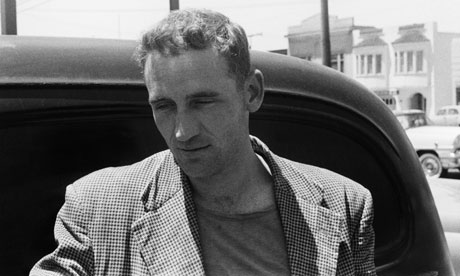“I had a vision of Dean, a burning shuddering frightful Angel, palpitating toward me across the road, approaching like a cloud, with enormous speed, pursuing me like the Shrouded Traveler on the plain, bearing down on me. I saw his huge face over the plains with the mad, bony purpose and the gleaming eyes; I saw his wings; I saw his old jalopy chariot with thousands of sparking flames shooting out from it; I saw the path it burned over the road; it even made its own road and went over the corn, through cities, destroying bridges, drying rivers. It came like wrath to the West. I knew Dean had gone mad again. There was no chance to send money to either wife if he took all his savings out of the bank and bought a car. Everything was up, the jig and all. Behind him charred ruins smoked. He rushed westward over the groaning and awful continent again, and soon he would arrive. We made hasty preparations for Dean. News was that he was going to drive me to Mexico.”
-Jack
Kerouac, On the Road
Neal
Cassady was doubtless an interesting character. He was the model for Dean
Moriarty in On the Road, as well as
Cody Pomeray in some of Kerouac’s other works. He was the inspiration for
Randle McMurphy in Ken Kesey’s One Flew
Over the Cuckoo’s Nest, was credited by Allen Ginsberg as the ‘secret hero’
of his poem “Howl,” and he figures prominently in Thomas Wolfe’s Electric Kool-Aid Acid Test.
That’s
quite a legacy. It’s the kind of legacy that makes you scratch your head and
ask, “just what exactly was wrong
with that dude?”
Now,
I’m not a licensed psychiatrist, but as a former pre-med undergraduate, I’m the next best thing this site’s got,
so let’s go ahead and diagnose him with Bi-Polar Disorder.
Yeah, I know I'm not breaking any new ground here- just google Neal Cassady bi-polar for proof, but I thought it would be interesting to take a
look at the symptoms of a manic episode, and see if we can find any evidence for
them in the text of On the Road specifically:
A manic episode is characterized by period of time where an elevated, expansive or notably irritable mood is present, lasting for at least one week. Three or more of the following symptoms must be present:
- Inflated self-esteem or grandiosity- Check
- Unusual energy, Decreased need for sleep (e.g., one feels rested after only 3 hours of sleep) - Check
- Excessive talk; racing thoughts- Check
- Euphoria or irritability- Check
- Flight of ideas or subjective experience that thoughts are racing- Check
- Attention is easily drawn to unimportant or irrelevant items- Check
- Increase in goal-directed activity (either socially, at work or school, or sexually) or psychomotor agitation- Check
- Impulsiveness, a reckless pursuit of gratification (shopping sprees, impetuous travel, more and sometimes promiscuous sex, high-risk business investments, fast driving) - Check

